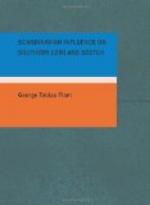AYNDING, sb. breathing, deriv. See aynd.
AYNDLESS, adj. breathless. Bruce, X, 609. See aynd.
BAIT, vb. to incite. Dunbar, 21127.
O.N. baeita, O. Ic. beita.
See B-S.
BAITH, BATH (b[-e]th), pron. both. M.E.
b[-o]þe, b[-a]þe, Cu.
beatth, Eng. both,
O.N. b[-a]ethir, O. Dan. b[-a]ethe.
Skeat.
BAITTENIN, pr. p. thriving. Jamieson.
O.N. batna, Eng. batten.
See Skeat, and Kluge and Lutz.
BAITTLE (b[-e]tl), sb. a pasture, a lea which
has thick sward of
grass. Jamieson, Dumfries.
O.N. baeita, “to feed,” baeiti,
pasturage. Cp. Norse
fjellbaeite, a mountain pasture.
BAN, vb. to swear, curse. Dunbar, 13,
47; Rolland, II, 680. O.N.
banna, to swear, to
curse, banna, a curse, Norse banna,
to swear, banning,
swearing, W. Sw. dial. baenn id., Dan.
bande, to swear, to
wish one bad luck, O.S. banna id.
M. Du. bannen means
to excommunicate. This is the L.G.
meaning. The Sco. usage
is distinctly Scand. It is also a
Northern word in Eng. diall.
Cp. Shetland to ban, to swear.
BANG, vb. to beat. Sat. P. 39, 150.
O.N. banga, O. Sw. banka,
Norse, banke, to beat,
to strike. Cp. Shetland bonga, in
“open de door dat’s
a bonga,” somebody is knocking, literally
“it knocks” Norse
det banka. Bang is very frequently used
in the sense of rushing off,
cp. Dalrymple’s translation of
Leslie, I, 324, 7.
BANGSTER, sb. a wrangler. Sat. P.
44, 257. Evidently Norse bang
+ Eng. suffix ster.
See bang vb. Cp. camstarrie, where
the second syllable corresponds
to that in Germ.
halsstarrig.
BARK, vb. to tan, to harden. Dunbar F.
202 and 239. Ramsay, I,
164, “barkit lether,”
tanned leather. O.N. barka, to tan,
Norse barka, to tan,
to harden, M.E. barkin. General
Scand. both sb. and vb.
In the sense “to tan” especially
W. Scand., cp. Sw. barka,
to take the bark off. O. Sw.
barka, however, has
the meaning “to tan.”
BARKNIT, adj. clotted, hardened. Douglas,
II, 84, 15. pp. of vb.
barken, to tan.
See above.
BASK, adj. dry, withering (of wind). Jamieson,
Dumfries. Dan.
barsk, hard, cold,
en barsk Vinter, a cold winter. Cp.
Sco. “a bask daw,”
a windy day. M.L.G. barsch and basch
do
not agree in meaning with
the Sco. word; besides the sk is
Scand. For loss of r
before sk cp. hask from harsk.




